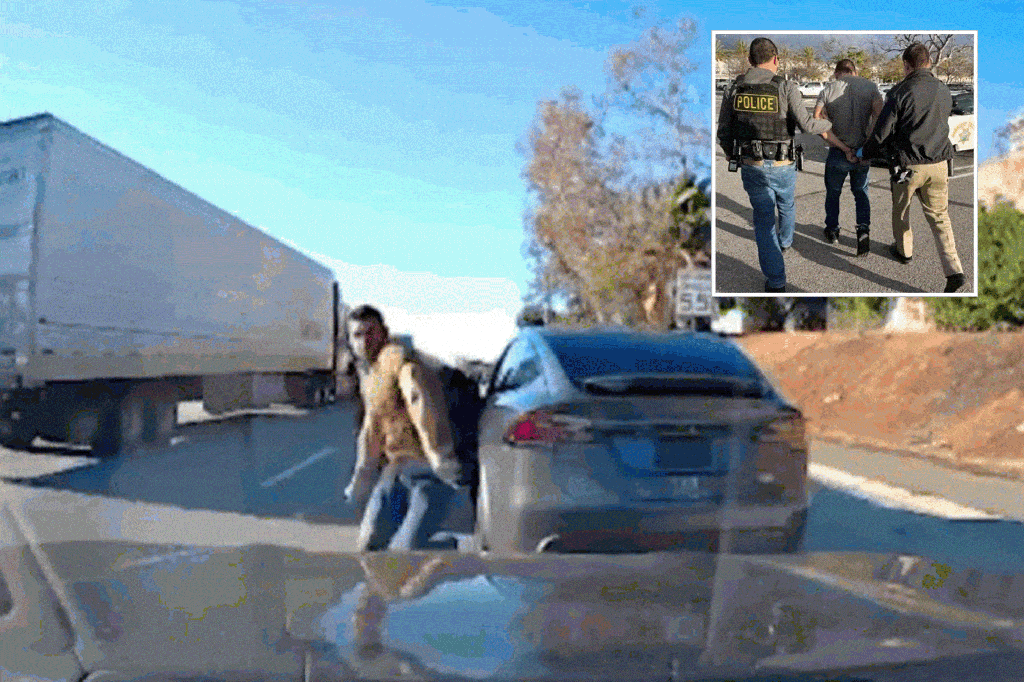A pipe-wielding Tesla driver who terrorized California highways with his fits of road rage was released from prison less than a year into his prison sentence on Wednesday, leaving his victims âdisappointedâ in the stateâs justice system.
Nathaniel Radimak, 37, was freed on parole from state prison on Wednesday after serving only ten months of the five-year sentence handed down to the hot-head EV driver last September, according to KTLA 5.
The California Department of Corrections and Rehabilitation said Radimak had served âhis full sentence as defined by lawâ and was granted 424 days for time served while awaiting sentencing, 212 for actual days in jail, and another 212 days for good behavior.
During Radimakâs run of terror, he would smash passing cars with a metal pipe, make threats and harass motorists across Southern California.
In a now-viral video, Radimak jumped out of his charcoal-colored 2022 Tesla Model X with no license plates armed with a pipe and pummeled the truck behind him on Jan. 11, 2023. Radimak drove away after striking the vehicle several times.
Radimak was arrested weeks later, where police discovered steroids and more than $30,000 in his car.
Following his arrest, it was discovered Radimak had a long rap sheet as a criminal âwhich spans nearly two decades and crosses multiple states,â KTLA reported, citing prosecutors.
Last September, Radimak was found guilty on several felony counts during his rampage from 2022 to 2023.
The road rager, however, would plead guilty to assault, vandalism, elder abuse, and criminal threats and was sentenced to five years in prison after he struck a plea deal with prosecutors.
Now released and back on the streets of California, several women who were victims of his rampage are outraged over his release and are âworriedâ for their safety.
High-profile attorney Gloria Allred represents three victims of Radimak’s attack.
âIâm very disappointed in the overall outcome of this case leading up to his release,â one of Radimakâs victims, identified as Jane Doe, told KTLA Wednesday.
âI highly doubt Radimak has learned from his mistakes and will be coming out a changed person after a short time.â
âIâm worried he will try to find the victims whose names have been released,â Jane Doe shared.
Allred said her clients were notified he was being freed from prison on the day of his release.
âHis early release has shocked and disappointed many of the victims whom I represent,â Allred told NBC Los Angeles.
âMany of these victims were never consulted about the plea deal and were never given a chance to speak at the sentencing.â
Another one of the Tesla terrorâs anonymous victims, identified as âJane Doe 1,â told NBC she âpraysâ his âbrief time behind bars taught him a lesson.â
Like Radimak’s other victims, she feels that Californiaâs justice system has let her down.
âParole boards continue to allow perpetrators to walk free after serving just minimal time, putting a lot of innocent people at risk and sending criminals the wrong message,â she said, slamming the Golden Stateâs leniency with how they handle criminals.
Californiaâs violent crime rate in 2023 was 18% higher than when Gov. Gavin Newsom assumed office in 2019, according to data from the Public Policy Institute of California.
In 2022, aggravated assaults in California increased by 25.3% and homicides by 33.9% compared to 2019.
Nearly all inmates in California automatically receive Good Conduct Credit (GCC) upon entering the penal system under Proposition 57, passed in November 2016 before Newsome took office.
According to a 2023 report by CBS News, GCC âshortens violent sentences by 33.3% and nonviolent sentences by 50-66.6% the day they arrive in prison.â
Since 2019, tens of thousands of felons have been released early with credits and then rearrested for violent crimes, the outlet reported.
âWe donât know if (CDCRâs programs) are working,â a principal investigator for the Public Policy Institute of California, Heather Harris, told the outlet in June 2023.
California lawmakers passed a bill requiring the CDCR to track the effectiveness of its rehabilitation programs following a state audit in 2018.
However, in 2019, Gov. Newsom vetoed the bill, stating it âwould require the California Department of Corrections and Rehabilitation to contract with a researcher to conduct a recidivism analysis of the effectiveness of rehabilitation programs and to submit a report to the Legislature. The goal of this bill can be accomplished administratively,â CBS reported.





